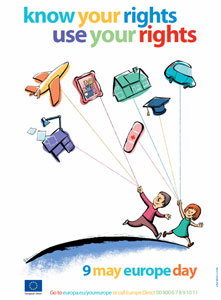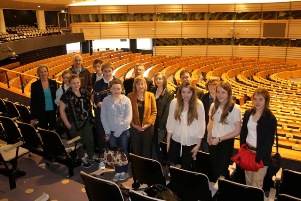

Global Citizenship blog
 There are many ways for teachers and pupils to increase their knowledge of Europe, its cultures and institutions, enabling them to become more active citizens of the European Union. Here’s just two:
There are many ways for teachers and pupils to increase their knowledge of Europe, its cultures and institutions, enabling them to become more active citizens of the European Union. Here’s just two:
Today primary school children from all over Scotland gathered at the Scottish Parliament for the final rounds of the Euroquiz competition. Teams of pupils answered questions about many aspects of life in Europe, with their classmates back at school able to see the event through a live broadcast on Holyrood TV. Pupils from Edinburgh Academy won the competition, (pictured here on the stairs of the Parliament) with Cairneyhill Primary in Fife the runner-up. Congratulations to all the young people who took part in the contest this year.
The Scottish European Educational Trust (SEET) has been running the quiz since 1993, as a means to promote and encourage learning about Europe, with sponsorship from Standard Life. The European Parliament office in Edinburgh also supports this work, and has a great variety of resources to help teachers embed a European dimension in their classrooms.
BBC Scotland website carried a news story about the day. And the BBC Radio Scotland show hosted by Fred Macaulay featured the competition in this morning’s broadcast. Fred interviewed a teacher and pupils from Kirknewton Primary School, who described the benefits of the experience and tested the knowledge of the radio presenters.
Comenius School Partnerships, funded by the European Commission, are another common way for students and teachers to increase their involvement with European isuues and cultures. Last week Hutchesons’ Grammar School held an event in Glasgow to celebrate the conclusion of a successful two year partnership with schools in Nuremberg, Germany, and Radomsko, Poland.
Students from these three high schools collaborated on a series of creativity projects, using photographs and film to document their activities and the urban spaces of each city. The organisers say “key to the success of the partnership has been a willingness to embrace new ideas, be open to cultural differences and recognise the benefits of exploring a range of different approaches to learning and teaching outwith the classroom”.
Nick
More Today is Europe Day, the annual date for celebration of the existence and activities of the European Union. Many Scottish schools work throughout the year to support student learning about Europe, taking part in initiatives such as the primary school Euroquiz
Today is Europe Day, the annual date for celebration of the existence and activities of the European Union. Many Scottish schools work throughout the year to support student learning about Europe, taking part in initiatives such as the primary school Euroquiz
This is also the month of ‘Comenius Week’, when schools celebrate the successes of intercultural dialogue achieved through the EU’s Comenius partnerships programmes. Scotland has benefitted from many Comenius school partnerships, with both bilateral and multilateral school projects, and the newer Regio programme has enabled partnership working at local authority level too.
All the major European organisations offer support to teachers who want to include a stronger European dimension to their work in schools. Three examples: the annual European Day of Languages (26th September) initiated by the Council of Europe; the education resources such as ‘Crisis Point’ produced by the European Parliament offices; and the resources such as ‘Passport to the EU’ created by the European Commission.
On this 9th May, a BBC News web story focuses on poor language skills among British people and the impact of this on their ability to win jobs with European institutions.
More Congratulations to the two students from Kings Park secondary school in Glasgow who won this year’s ‘Talk your way to Brussels’ speaking competition. This annual event is organised by the Scottish European Educational Trust (SEET), and sponsored by IBM, and requires young Scots to demonstrate their ability with a foreign language.
Congratulations to the two students from Kings Park secondary school in Glasgow who won this year’s ‘Talk your way to Brussels’ speaking competition. This annual event is organised by the Scottish European Educational Trust (SEET), and sponsored by IBM, and requires young Scots to demonstrate their ability with a foreign language.
Mark Pentleton of Radio Lingua supported the competition by training the student teams in how to make a video diary of their time at the finals in Brussels, providing participants with a download of the company’s web based language courses, and offering ipods for the winners. The finalists produced a promo video about their visit to the European Parliament with MEP David Martin.
More This is a 3 year project funded by the European Union, promoting learning, dialogue and action on climate change through linking 11-19 year olds in primary and secondary schools, as well as youth groups in the EU (UK, Netherlands and Bulgaria) with those in Africa (Malawi, Senegal and Kenya).
This is a 3 year project funded by the European Union, promoting learning, dialogue and action on climate change through linking 11-19 year olds in primary and secondary schools, as well as youth groups in the EU (UK, Netherlands and Bulgaria) with those in Africa (Malawi, Senegal and Kenya).
Participating schools and youth groups will learn about climate change using specifically designed Learning Resources and a user-friendly, interactive web platform. The Learning Resources include flexible lesson plans, teaching resources and supplementary worksheets for young people, to explore the human challenges presented by climate change and the effect it is having on the lives of real people around the world.
Using the web platform, young people will connect with one another via messaging, blogging and group discussions to exchange their ideas and experiences of climate change, and collaborate on projects and campaigns locally, nationally and internationally. By discussing climate change with their peers abroad, young people will gain insight into cultural differences, personal similarities and what they can do to make positive changes for the future of the planet.
Find out more at: http://www.mtl-cec.org/
MoreLTS is running a group study visit to Brussels through its Scottish Continuing International Professional Development programme. Targeted at teachers and promoted staff, this short intensive visit will take place from 26th-28th March 2008. It aims to increase understanding of European institutions, education policy and programmes; raise awareness of the opportunities for Scottish teachers and schools to engage with Europe; and explore the potential for future collaborative activities with a European dimension.
Contact Nick Morgan at LTS in Glasgow for further information. [email protected]
More
Find us on